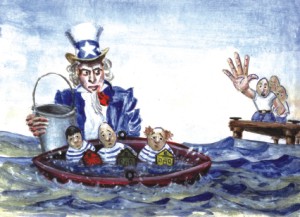| Economy
Please Sir, May I Have a Bailout?
Bailouts suggest relief from an unwarranted predicament. In the
murky world of the financial crisis, nothing is as simple.
Faruq Hasan
 The present situation with financial firms all over the world lining up for state salvation seems strangely Dickensian to me: young Oliver Twist and his cohort of orphans lining up pitifully in front of the heartless Mr Bumble, imploring for some extra porridge during lunchtime. That is pretty much where all the similarities end, since governments aren't really as heartless as Mr Bumble, and financial firms aren't as innocent and dewy-eyed as they claim to be. The present situation with financial firms all over the world lining up for state salvation seems strangely Dickensian to me: young Oliver Twist and his cohort of orphans lining up pitifully in front of the heartless Mr Bumble, imploring for some extra porridge during lunchtime. That is pretty much where all the similarities end, since governments aren't really as heartless as Mr Bumble, and financial firms aren't as innocent and dewy-eyed as they claim to be.
For a start, let's do a quick analysis of the bailout, including why we need it in the first place. It all started with the collapse of some important banks and insurance companies like Bear Sterns and AIG. If you are a customer of one of these firms, and you want to avail their services by taking out an insurance policy or saving your money with them and earning an interest, you would expect these firms to have enough liquid assets to back up their claims of paying you (in the form of interests or insurance payments) whenever you present a valid claim. Since these organisations basically survive and profit with your money, you trust them to have invested solidly over the long run and thus have enough liquid assets to back their claims.
Unfortunately, firms aren't always smart with their money. Instead of having a healthy amount of liquid assets, most firms had lots of pieces of paper from other institutions saying that if they ever needed money, they may have it. The bad news is, most of these pieces of paper were tied to real estate, which began shrinking in value. The assumption behind such an investment was that the value of real estate can only go up, an assumption that went badly wrong.
The market can be a cold and hard place; normally when you make a bad investment choice, you are punished for it. The market needs to correct itself, and companies like AIG were supposed to go belly up. The problem is, these organisations have the fortunes of millions of common people riding their back. Letting these institutions fail would not only bankrupt common everyday people, but also send signals to the market saying that governments don't really care about its citizens.
Instead, what most governments ended up doing is trying to “bail out” such firms. From the US to the Netherlands, bail out has entered our lexicon and conjures up fuzzy feelings about the benevolent state helping out the blameless financial firms. This is where things start getting messy.
For starters, the bailout isn't really going to reach the customers of the bank, people who actually need the money. True, it would restore balance to those companies whose financial portfolios have been severely affected by the crisis, as well as help the firms continue making money on less risky investments in order to recoup their losses. So it sounds like a decent plan right?
Wrong. To begin with, governments will trust the same management that got the firms in trouble in the first place. Sure, the government will “own” these institutions, but the management style will remain the same. What the government is doing is loaning these institutes some money that has to be paid back (on relatively soft terms) to get them on their feet again. This is not going to change the lives and financial situations of people who have already lost a bundle. Chances are, the radical shift in values and paradigms that was needed after such a disaster simply isn't going to happen.
 |
| The bailout is not going to help taxpayers anywhere in the world. |
But the bad news is just starting. The bailout money (which amounts to $700 billion in case of the US and amounts to 5 percent of the entire US economy) isn't coming from “real” reserves. Most governments, who are handling out bailout money, including the US, are in deep debt. But since governments can print money, they can pump liquidity into the market. What governments don't tell their constituents is that even governments need to pay off their debts. And the only way they can do this is either by raising taxes or cutting down on spending. Eventually, all repercussions lead to the common Joe and not to the managers of our economy who were the ones who actually made the investment choices.
In summary, the bailout is not going to help taxpayers anywhere in the world. Here in Bangladesh, we have been saved from facing the brunt of the crisis. But poor consumers in the West mean poor exporters here in Bangladesh, so what affects the financial health of the rest of the world affects us in the long run. A bailout could have been beneficial: instead of directly funding and buying off the firms, governments abroad could have invested the money in better regulations and laws, or better yet give direct financial assistance to those who have been burnt by the crisis. Governments could have taken a leaf out of Oliver Twist and do a Mr Bumble: simply refuse to give more porridge. Instead, we have a continuation of the same financial malpractices that got us into this in the first place. No one seems to be reading their Victorian Literature anymore.
Copyright (R) thedailystar.net 2008
|
